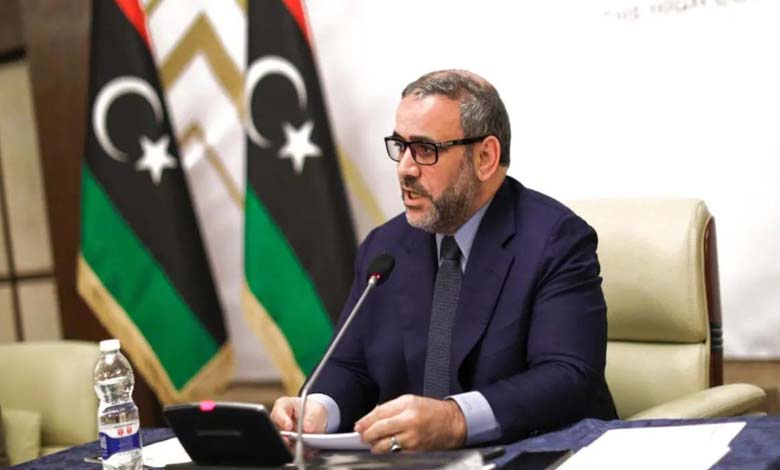Al-Mishri Denies New Session to Elect Head of Libya’s High Council of State

Khaled Al-Mishri asserts the legitimacy of his presidency, citing a Supreme Court ruling, as he faces off against Mohamed Takala, backed by Prime Minister Dbeibah.
Khaled Al-Mishri, currently entangled in a leadership dispute with Mohamed Takala over the presidency of the High Council of State (HCS), has denied media reports suggesting an internal agreement to hold a new election session, emphasizing his legal mandate based on a Supreme Court ruling, amid a heated political standoff in Libya between factions seeking to remove Prime Minister Abdulhamid Dbeibah and those aligned with him.
-
Counterfeit Billions in Libya Prompt Dbeibah to Demand Immediate Investigation
-
Escalating Tensions Between Dbeibah and Parliament Over Parallel Spending
-
The Trump Administration Pushes for Elections in Libya
In a statement published on its official Facebook page, the HCS’s media office refuted claims of any agreement among members to convene a new election, stressing that such reports are “completely false” and lack any official basis. It affirmed that the Council is currently working to finalize the composition of its current presidency, with the aim of resuming its political and legislative activities.
Al-Mishri reaffirmed his full commitment to what he described as “legal and judicial legitimacy”, stating that the Libyan Supreme Court issued a final ruling confirming the validity of his election. He argued that any attempt to undermine this legitimacy or create alternative paths constitutes a breach of judicial rulings and an interference in institutional independence.
-
Dbeibah Turns to the Muslim Brotherhood, Haftar Warns of Decisive Moment… Libya on a Knife’s Edge
-
Gheniwa’s Blood Strangles Dbeibah… Tripoli’s Nero Burns in His Own Fire
-
Accusations of Bias Target UN Mission in Libya
Analysts say Al-Mishri’s reliance on the court ruling reflects not only his personal resolve to retain his position, but also a broader political movement seeking to maintain institutional balance in the face of Dbeibah’s attempts to consolidate power.
The current power struggle over the HCS presidency is seen as a symptom of a deeper political division that has plagued Libya for months. While Takala enjoys the open support of the Tripoli-based Government of National Unity (GNU), Al-Mishri is viewed as part of a bloc aiming to replace the current executive authority with a new government.
-
Mohammed el-Menfi intensifies pressure on Dbeibah by criticizing spending file
-
Failure of Inter-Libyan Dialog Meeting Sparks War of Words between Dbeibah and Bachaga
-
Libya: Dbeibeh Uses Religion and Wealth to Cling to Power as Protesters Intensify Pressure
This division highlights competing visions among domestic actors—many backed by international and regional powers—about the direction of the political process, and the form of leadership that should guide the country toward elections.
The roots of this tension date back to August 2024, when disputed internal elections within the HCS sparked a serious rift between Al-Mishri and Takala, and fragmented the Council into rival factions.
Recent developments show a growing alignment between House of Representatives Speaker Aguila Saleh and Khaled Al-Mishri, culminating in a shared initiative to remove the GNU and form a new, jointly backed government.
-
Accusations of Bias Target UN Mission in Libya
-
Libyans Persist in Street Protests to Oust Dbeibeh — A Message to Tetteh
-
Violence erupts in Tripoli after protesters opposing Dbeibeh are dispersed
A meeting between Al-Mishri and Saleh on July 7 reinforced this direction, as both leaders discussed mechanisms for a unified political roadmap leading to the formation of a transitional authority tasked with organizing simultaneous presidential and parliamentary elections, with the goal of ending the post-2021 transitional period.
Observers interpret this coordination as a shift in Libya’s political alliances, transcending traditional East-West divides, with the removal of Dbeibah as a unifying objective.
-
UN and Regional Efforts to Contain Tensions in Tripoli
-
Salvation Friday: Libyans Hold Their Breath Amid Fears of Militia Chaos
-
Benghazi at the Heart of Regional Dynamics: Diplomatic Moves Amid Tripoli’s Turmoil
Critics of the GNU accuse Prime Minister Dbeibah of manipulating state institutions to extend his grip on power, particularly through his support for Takala within the HCS, a body seen as a key political player in negotiations with the parliament and international actors.
Dbeibah has come under mounting criticism from various factions who say he is deliberately stalling elections and violating earlier commitments made to the United Nations.
Analysts argue that Dbeibah’s effort to fortify his institutional allies is meant to block any opposing political front that could lead to his ousting, especially amid intense regional and international consultations regarding Libya’s next transitional phase.
-
Where is Western Libya Heading? Open Scenarios for the Future of the Conflict
-
Libyan Expert: Dbeibeh’s Move Is Too Late… Militias Have Become Partners in Power
-
Corruption and Terrorism Financing Drive Washington to Suspend Aid to Libya
Libya thus remains mired in political paralysis, with conflicting views over the legitimacy of the government and parliament, as an unspoken power struggle escalates between pro-Dbeibah forces and those demanding his removal.
While the international community continues to call for a revival of the political track and electoral process, Libya today faces a highly complex and polarized political landscape, where the public’s aspirations for stability remain hostage to persistent institutional and partisan rivalry.












